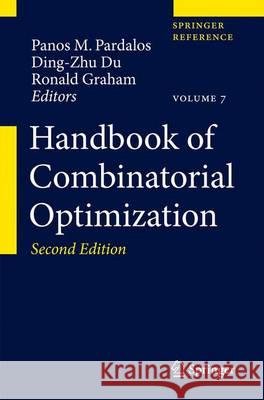Handbook of Combinatorial Optimization » książka



Handbook of Combinatorial Optimization
ISBN-13: 9781441979964 / Angielski / Twarda / 2013 / 3409 str.
Handbook of Combinatorial Optimization
ISBN-13: 9781441979964 / Angielski / Twarda / 2013 / 3409 str.
(netto: 2113,61 VAT: 5%)
Najniższa cena z 30 dni: 1927,76
ok. 16-18 dni roboczych.
Darmowa dostawa!
This seven-volume resource serves as a basic, yet comprehensive reference work in combinatorial optimization. It deals with several algorithmic approaches for discrete problems as well as with many combinatorial problems.
Wydanie ilustrowane
A Unified Approach for Domination Problems on Different Network Topologies
Advanced Techniques for Dynamic Programming
Advances in Group Testing
Advances in Scheduling Problems
Algebrization and Randomization Methods
Algorithmic Aspects of Domination in Graphs
Algorithms and Metaheuristics for Combinatorial Matrices
Algorithms for the Satisfiability Problem
Bin Packing Approximation Algorithms: Survey and Classification
Binary Unconstrained Quadratic Optimization Problem
Combinatorial Optimization Algorithms for Probe Design and Selection Problems
Combinatorial Optimization in Data Mining
Combinatorial Optimization Techniques for Network-based Data Mining
Combinatorial Optimization Techniques in Transportation and Logistic Networks
Complexity Issues on PTAS
Computing Distances between Evolutionary Trees
Connected Dominating Set in Wireless Networks
Connections between Continuous and Discrete Extremum Problems, Generalized Systems and Variational Inequalities
Coverage Problems in Sensor Networks
Data Correcting Approach for Routing and Location in Networks
Dual Integrality in Combinatorial Optimization
Dynamical System Approaches to Combinatorial Optimization
Efficient Algorithms for Geometric Shortest Path Query Problems
Energy Efficiency in Wireless Networks
Equitable Coloring of Graphs
Faster and Space Efficient Exact Exponential Algorithms: Combinatorial and Algebraic Approaches
Fault-Tolerant Facility Allocation
Fractional Combinatorial Optimization
Fuzzy Combinatorial Optimization Problems
Geometric Optimization in Wireless Networks
Gradient-Constrained Minimum Interconnection Networks
Graph Searching and Related Problems
Graph Theoretic Clique Relaxations and Applications
Greedy Approximation Algorithms
Hardness and Approximation of Network Vulnerability
Job Shop Scheduling with Petri Nets
Key Tree Optimization
Linear Programming Analysis of Switching Networks
Map of Geometric Minimal Cuts with Applications
Max-Coloring
Maximum Flow Problems and an NP-complete variant on Edge Labeled Graphs
Modern Network Interdiction Problems and Algorithms
Network Optimization
Neural Network Models in Combinatorial Optimization
On Coloring Problems
Online and Semi-online Scheduling
Online Frequency Allocation and Mechanism Design for Cognitive Radio Wireless Networks
Optimal Partitions
Optimization in Multi-Channel Wireless Networks
Optimization Problems in Data Broadcasting
Optimization Problems in Online Social Networks
Optimizing Data Collection Capacity in Wireless Networks
Packing Circles in Circles and Applications
Partition in High Dimensional Spaces
Probabilistic Verification and Non-approximability
Protein Docking Problem as Combinatorial Optimization Using Beta-complex
Quadratic Assignment Problems
Reactive Business Intelligence: Combining the Power of Optimization with Machine Learning
Reformulation-Linearization Techniques for Discrete Optimization Problems
Resource Allocation Problems
Rollout Algorithms for Discrete Optimization: A Survey
Simplicial Methods for Approximating Fixed Point with Applications in Combinatorial Optimizations
Small World Networks in Computational Neuroscience
Social Structure Detection
Steiner Minimal Trees: An Introduction, Parallel Computation and Future Work
Steiner Minimum Trees in E^3
Tabu Search
Variations of Dominating Set Problem
Panos M. Pardalos, Ding-Zhu Du, and Ronald Graham are prominent members of the operations research and mathematics communities. See supplementary PDF for additional biography material.
The second edition of this 5-volume handbook is intended to be a basic yet comprehensive reference work in combinatorial optimization that will benefit newcomers and researchers for years to come. This multi-volume work deals with several algorithmic approaches for discrete problems as well as with many combinatorial problems. The editors have brought together almost every aspect of this enormous field of combinatorial optimization, an area of research at the intersection of applied mathematics, computer science, and operations research and which overlaps with many other areas such as computation complexity, computational biology, VLSI design, communications networks, and management science. An international team of 30-40 experts in the field form the editorial board.
The Handbook of Combinatorial Optimization, second edition is addressed to all scientists who use combinatorial optimization methods to model and solve problems. Experts in the field as well as non-specialists will find the material stimulating and useful.
1997-2026 DolnySlask.com Agencja Internetowa
KrainaKsiazek.PL - Księgarnia Internetowa









